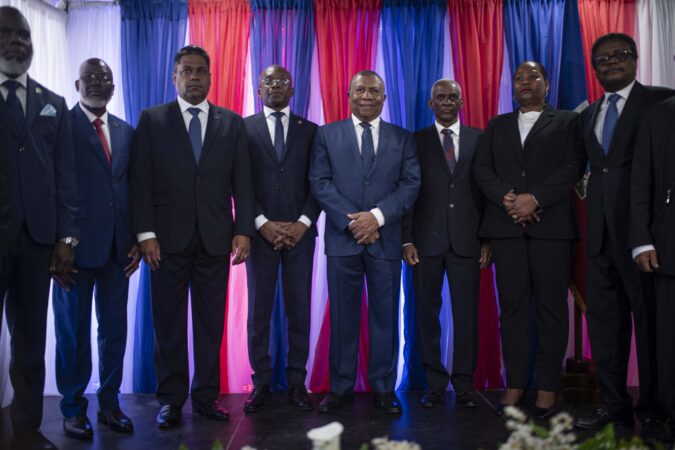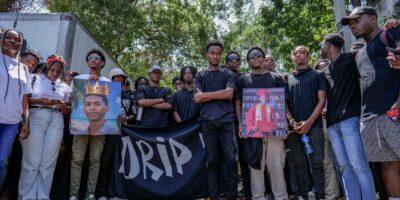The fragile agreement reached to lead the transition is going through a moment of major tumult
On April 25, 2024, nine political figures, some with stern looks, stand in front of the lenses of journalists’ cameras, at the Villa d’Accueil de Bourdon.
After being triumphantly sworn in at the Presidential Palace, despite the opposition of the gangs, the members of the new Presidential Council showed themselves to the world, as a collective, ready to face the major challenges of the transition.

Members of the Presidential Council take part in a photo opportunity during the ceremony of their installation on April 25, 2024 at the Villa d’Accueil, in Musseau. | © Pedro Anza for AyiboPost
The appearance of cohesion had created a surprise. But that was just that, an appearance… probably.
Five days later, the united front exploded, giving way to what some in the process call « a coup » of four groups, seizing « without a vote » the presidency of the Council and the choice of a prime minister.
The affair had something solemn about it when, this Tuesday, at the Villa d’Accueil, a member of the Council, Frinel Joseph, announced that Edgard Leblanc Fils, co-founder of the party « Oganizasyon Pèp K ap Lite » (OPL), is to take over the presidency of the structure following an agreement reached between four of the seven members entitled to vote.
And to everyone’s surprise, Joseph also announced the choice of Fritz Bélizaire, a former minister, as the next head of government, also supported by the Bloc of Four.
The appearance of cohesion had created a surprise. But that was just that, an appearance… probably.
These choices are the result of an agreement between the collective of political parties of 30 January, close to former president Michel Martelly, the EDE-RED & Compromise Bloc, composed in particular of former executives of Jovenel Moïse’s government, the Pitit Dessalines party having chosen the Prime Minister, according to a source, as well as the Agreement of 21 December, backed by the supporters of the resigned government of Ariel Henry.
Read also: Disagreements over the decree creating the Presidential Council
Contrary to the announcements, « there was no vote, this is unacceptable for us, » a source involved in the process told AyiboPost. « This is a pie sharing by four sectors and their advisers, which contravenes the political agreement signed between us. »
According to a source, it all took place in the early hours of Tuesday, April 30. An agreement for a rotating presidency had been reached.
Leslie Voltaire from Fanmi Lavalas as well as Fritz Alphonse Jean from Montana would have withdrawn their candidacy in this scenario. And Edgard Leblanc Fils was supposed to be the first to assume the position. But early in the morning, according to the source, the latter reversed course.
Edgard Leblanc Fils could not be reached for comment prior to publication. This article will be updated in case of feedback from him.
In a note published on Tuesday afternoon, the Montana Accord Monitoring Office denounced the group of four which, according to Montana, « continues to play politics without ethics, betraying the commitments made publicly in the April 3 Agreement. »
According to Montana, « mafia » political and economic forces have decided to « take control of the Presidential Council and the government in order to continue to control the extractive state (…). »
At least since the assassination of former President Jovenel Moïse in July 2021, Haiti has been legally navigating troubled waters.
Ariel Henry, chosen as prime minister by the late head of state, had not completed the formalities to take office at the time of the assassination. He will be propelled to the helm of the country by the CORE group, an informal coalition of diplomats accredited to Haiti under the leadership of the United States.
The prime minister’s international supporters let him go in February, on the sidelines of a major gang attack in Port-au-Prince, on state infrastructure.
Early next month, a political agreement was reached to create a nine-member Presidential Council, seven of which have voting rights. These members are chosen by political groups with often antagonistic interests, ideologies, and alliances.
The so-called April 3 agreement, reached on the sidelines of negotiations led by the Caribbean Community, requires the Prime Minister to be appointed in consultation, on the basis of a list of one name submitted by each of the sectors not exceeding a total of fifteen candidates.
The announcement of Fritz Belizaire’s choice appears to contravene the requirements of the Agreement. « There was an effort to find a consensus among the stakeholders, but the coalition around Edgard Leblanc has engaged in a political coup, » another source directly involved in the process told AyiboPost.
The already fragile consensus is faltering. The majority coalition includes people close to former president Michel Martelly, who is under Canadian sanction for gang financing, supporters and former opponents of Ariel Henry’s government.
A member of one of the groups contacted by AyiboPost asked for the process to be fully resumed, « in accordance with the Agreement ». Another said the release of the prime minister’s name was premature and « unacceptable ». It is unclear whether an agreement will be reached, or whether the three voting members who feel excluded will resign — jeopardizing the very survival of the initiative.
« The council has just made its first misstep, » says Pierre Espérance. The Executive Director of the National Network for the Defense of Human Rights criticizes the announcements made outside of a formal amendment to the 3 April Agreement. « It’s like having a council with four members, » says the human rights defender.
The new majority promises to hand over power to those elected in the next elections on 7 February 2026. « We believe in the council. The first important thing for us is the cohesion between us, » said Edgard Leblanc Jr., in an impromptu speech on Tuesday at the Villa d’Accueil.
AyiboPost has obtained a document entitled « Constitution of an Indissoluble Majority Bloc (IMB) within the Presidential Council » signed yesterday, April 29, by the representatives of the Group of Four.
According to this document, the new majority takes its decisions by consensus « or, failing that, by a majority of three out of four » concerning the election of the President of the Council, the appointment of the Prime Minister, the constitution of a government of national unity, the establishment of the Provisional Electoral Council and the assurance of the success of the transitional mission.
A charter on the operation of the block will be drawn up in the future, according to the signatories. It is unclear whether a dissident member of the « indissoluble » bloc can vote in certain cases with the rest of the Council.
The power dynamics in the council have yet to be established. The agreement of 3 April provides for a « Document on the organisation and functioning of the Presidential Council ». This document has not yet been made public.
Thus, there is no indication as to whether political parties and groupings can replace their delegates during the transition. The specific tasks of the Chairman of the Council are not defined and its unclear if the actual members will submit legal documents deemed necessary by the decree creating the council.
« The challenges are enormous, » Jean Eddy Saint Paul, the first director of the Haitian Studies Institute at the City University of New York, said Thursday.
According to the academic, « many actors have benefited from the chaotic situation in the country » and « the terrorist-gangsters have their masters who will continue to do everything to prevent positive changes ».
The Council tasked with pacifying the country and organising elections must also manage a humanitarian emergency, in a country where half of the population is food insecure. « Building trust is possible, but it will depend on their ability to do politics with an ethic of responsibility, » according to Eddy Saint Paul.
By Widlore Mérancourt, Wethzer Piercin and Jerôme Wendy Norestyl
Cover image: Edgard Leblanc Fils is appointed President of the Presidential Transitional Council of Haiti on Tuesday, April 30, 2024. • ©ODELYN JOSEPH / APP
Keep in touch with AyiboPost via:
► Our Telegram channel : click here
► Our WhatsApp Channel : click here
► Our CommunityWhatsApp:click here







Comments